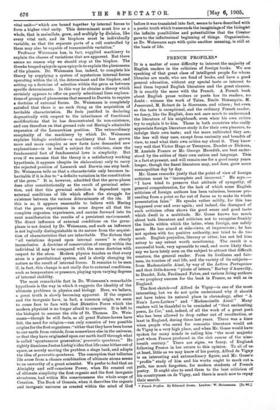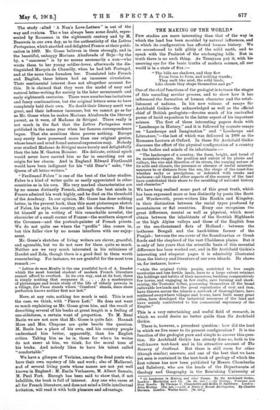IT is a matter of some difficulty to interest the
majority of English readers in the criticism of foreign books. We are speaking of that great class of intelligent people for whom libraries are made, who are fond of books, and have a good general education, without any special taste or interest to lead them beyond English literature and the great classics. It is exactly the same with the French. A French book about English prose writers or poets has its readers, no doubt : witness the work of Taine, Emile Hennequin, M. Jusserand, M. Robert de In Sizeranne, and others ; but even so the taste is exceptional, and the ordinary French reader,. we fancy, like the English, does not care much to understand the literature of his neighbouik, even when his own critics. try to explain it to him. Those in both countries who really appreciate foreign literature study it for their own pleasure, to indulge their own taste; and the more cultivated they are,. the less will they care, except from curiosity and breadth of view, to read what their own critics say about it. They know very well that Victor Hugo or Tennyson, Daudet or Dickens, M. Anatole France or Mr. George Meredith, are best under- stood by the critics of their own nation and language. This. is a fact at present, and will remain one for a good many years longer, though the finest literature may, and does, grow more cosmopolitan day by day.
Mr. Gosse remarks justly that the point of view of foreign criticism must be " incomplete and incorrect." He says :— " I have tried to preserve that attitude of sympathy, of general comprehension, for the lack of which some English criticism of foreign authors has been valueless, because pro- ceeding from a point so far out of focus as to make its whole presentation false." He speaks rather mildly, for this has happened over and over again ; and indeed, the disregard of such criticism often shows the good sense and good taste which dwell in a multitude. Mr.. Gosse knows too much about both literature and criticism not to recognise frankly- the limits within which the latter, when foreign, can safely move. He has aimed at side-views, at impressions ; he has not spoken with too positive authority, nor tried to do too much. English prejudice, literary or other, has not led him astray to any extent worth mentioning. The result is a. successful book, very agreeable to read, and more likely than any we have lately seen on the subject to attract that difficult creature, the general reader. From its liveliness and fair- ness, its touches of real life, and the variety of its subjects— from Mademoiselle Aisse, by way of the Lettres Portugaises and that little-known " pirate of letters," Barbey d'Aurevilly, to Daudet, Zola, Ferdinand Fabre, and various living authors —we prophesy success for the book in France, as well as in England.
The first sketch—of Alfred de Vigny—is one of the most. interesting, but we do not quite understand why it should. not have taken its natural place in chronology, after " A Nun's Love-Letters " and " Mademoiselle Aisse." Many readers will be thankful to be reminded of "that enchanting poem, Le Cor," and, indeed, of all the work of a great poet who has been allowed to drop rather out of recollection, at least in England, during these last years. There was a time when people who cared for romantic literature would set de Vigny in a very high place, and when Mr. Gosse would have spoken for many minds in calling him "the most majestic poet whom France produced in the rich course of the nine- teenth century." There are signs, we fancy, of England. following France in her return to this opinion. To all of us- at least, little as we may know of his poetry, Alfred de Vigny is an interesting and extraordinary figure, and Mr. Gosse's- " profile " study of him and his works ought to mark out a. path, too much forgotten, for modern students of French poetry. It ought also to send them to the best criticism of his countrymen on de Vigny, and there is much now to repay their search.
• French Profiles. By Edmund Gosse. London : W. Heinemann. LTe..6d.1 sented by Rousseau in the eighteenth century and by M. Beauvois in our own day, as to the authenticity of the Lettres Portugaises, which startled and delighted France at their publi- cation in 1669. Mr. Gosse believes in them strongly, and in
the beautiful, unhappy Mariana Alcaforada of Beja—by the by, a " canoness " is by no means necessarily a nun—who wrote them to her young soldier-lover, afterwards the dis- tinguished Marquis de Chamilly, when he had left Portugal, and at the same time forsaken her. Translated into French and English, these letters had an immense circulation.
Their sentimental interest does not altogether account for this. It is claimed that they were the model of easy and natural letter-writing for society in the later seventeenth and early eighteenth centuries. There were numberless imitations and fancy continuations, but the original letters seem to have completely held their own. No doubt their literary merit was great, and their influence immense, but we cannot go as far as Mr. Gosse when he makes Mariana Alcaforada the literary parent, as it were, of Madame de Sevigne. There really is
not much in the fact that the Lettres Portugaises were published in the same year when her famous correspondence began. That she mentions them proves nothing. Europe
may surely have possessed more than one original genius, whose heart and mind found natural expression easy. Nobody ever studied Madame de Sevigne more keenly and delightfully than the late M. Gaston Boissier. His delicate, critical spirit would never have carried him so far in searching out an origin for her charm. And in England Edward FitzGerald would have been indignant for his "'old Dear's" sake, "the Queen of all letter-writers."
" Ferdinand Fabre " is one of the best of the later studies. Fabre is a kind of writer quite as easily appreciated in other countries as in his own. His very marked characteristics are by no means distinctly French, although the best minds in
France admired his work highly, and he died on the threshold of the Academy. In our opinion, Mr. Gosse has done nothing
better, in the present book, than this most picturesque sketch of Fabre, his style, his country, and his characters. He has let himself go in writing of this remarkable novelist, the chronicler of a small corner of France—the southern slopes of the Cevennes—and the portrait-painter of French priests. We do not quite see where the "profile" idea comes in, but this fuller view by no means interferes with our enjoy- ment.
Mr. Gosse's sketches of living writers are clever, graceful, and agreeable, but we do not care for them quite so much.
Neither are we very much interested in his criticisms of Daudet and Zola, though there is a good deal in them worth
remembering. For instance, we are grateful for the most true remark :— "Lettres de mon Moulin is the one youthful book of A. Daudet which the most hurried student of modern French literature cannot afford to overlook. In its own way, and at its best, there is simply nothing that surpasses it As a masterpiece of picturesque and ironic study of the life of elderly persons in a village, Les Vieux stands where ' Cranford' stands, since sheer perfection knows neither first nor last."
Here, at any rate, nothing too much is said. This is not
the case, we think, with " Pierre Loti." He does not want so mach explaining as Mr. Gosse gives him, and the result of describing several of his books at great length is a feeling of one-sidedness, a certain want of proportion. To M. Rene Bazin we are not sure that Mr. Gosse is quite fair. Hannah More and Mrs. Chapone are quite beside the question. M. Bazin has a place of his own, and his country people understand him better, apparently, than his English
critics. Taking him as he is, those for whom he writes do not sneer at him, we think, for the moral tone of
his books. And nobody likes to have his talent called " comfortable."
We have a glimpse of Verlaine, among the dead poets who have their own mystery of life and work ; also of Mallarme, and of several living poets whose names are not yet well known in England : M. Emile Verhaeren, M. Albert Samain, M. Paul Fort. Enough has been said to show that, if not infallible, the book is full of interest. Any one who cares at all for French literature, and does not mind a little intellectual irritation, will read it with both pleasure and advantage. Geikie.











































 Previous page
Previous page